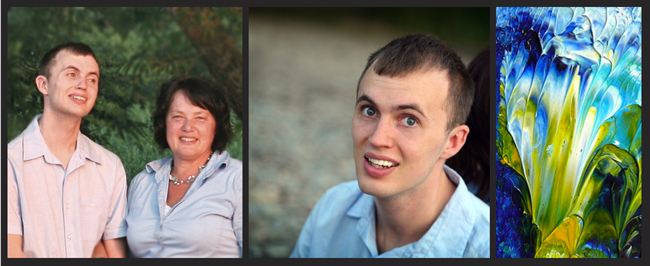In Canada, every three minutes someone sustains an acquired brain injury (ABI) - an injury to the brain occurring after birth that is not related to cognitive or genetic conditions. One in 10 of us will know someone who will experience an ABI this year.

Written by Dianne Henderson, In-house Medical Consultant & Brenda Agnew, Client Liaison As much as we try to imagine the emotional, physical, and financial toll these injuries take on so many lives, it often takes the story of one individual to bring everything into focus. Watch a video about Ben's story.
Benjamin's inspirational story.
In the fall of 2002, Benjamin Sloetjes was a fun-loving 18-year-old who had a budding interest in music, a talent for computers and athletics, and a zest for life that inspired his many friends and family members. On a beautiful autumn day, he told his mother, Anita, that he planned to do some work on his car. A short time later, Anita had a terrible feeling that something was wrong. She went to check on her son. Tragically the car he was working on slipped and crushed him. As she frantically sought out help, Benjamin's brain was starved of oxygen for 20 agonizing minutes. Airlifted to a hospital, Benjamin was in a coma and the prognosis was grim - especially as his blood pressure dropped dangerously low. But Anita and her family refused to give up hope and held strong in their faith. Miraculously, Benjamin pulled through. After seven months of intensive rehabilitation therapy, he was able to return home. Nevertheless, the Benjamin that returned in April 2003 was very different from the Benjamin who had left many months earlier.Life after an ABI.
The severity of symptoms related to an acquired brain injury can differ significantly due to the part or parts of the brain that are damaged. Symptoms can be physical (problems with movement/balance, speech, seizures, and altered sensations), cognitive (memory, planning, judgment, attention, communication) and/or emotional or behavioural (depression, anxiety, loss of emotional control, personality changes, lack of self-awareness). Benjamin's family was told that he would never walk, talk, or play the piano again. Perhaps even more distressing, they were told that he would not be able to experience emotion as a result of his injury. As they contemplate their new reality and differing levels of ability, some survivors of brain injuries without adequate support networks begin to withdraw from life. They suffer from isolation, social exclusion and depression. Tragically, 22 per cent of people who suffer catastrophic brain injuries reportedly never leave their home. But when survivors and their loved ones receive the proper resources, support and encouragement, the hope it inspires can do wonders. When Anita contacted Gluckstein Lawyers, we matched Benjamin and his family with a case manager who helped to coordinate the intensive home therapy he needed. Inspired by our enthusiasm, advocacy and belief in Benjamin, his family's hope for a better future grew. "Under their watch, my son was not just another statistic," Anita says. "He was a human being who deserved the best shot at life possible. When they believed in him, I realized that I was capable of believing in him and, that together, we could conquer brain injury."To be alive and thrive.
Today, Benjamin's recovery has taken him in wonderfully unexpected directions. As a part of his therapy (which focused on walking and balance, speech pathology, and cognitive and fine motor skills), Anita began to provide opportunities for Benjamin to participate in emotive painting. Benjamin is presented with a variety of paint colours and is asked which hues he'd like to use for a project. With a paintbrush in hand, his movement generates his expression into an artistic work. Benjamin's artwork has been recognized by the Hamilton Health Science Group, St. Michael's Hospital in Toronto, the Canadian Art Society and by Ontario's Lieutenant Governor General with three proud displays in Toronto. Benjamin's tragic accident changed the direction of his life forever; but, with the help of a supportive network of family, friends and community resources, his new direction is a superb example of the quality of life that can be achieved when you have hope and the resources necessary to realize your potential. In our most recent check-in with Anita, we were pleased to learn and are delighted to report that some of Benjamin's art has been selected to be featured in the Stan Cassidy Centre for Rehabilitation. Moreover, Anita has also made contact with families of the survivors of the Humboldt Broncos bus crash tragedy to offer support and share some of what she has learned as the mother of a brain injury survivor.Full-circle client care.
Beyond brain injury statistics, there are stories like Benjamin's. These stories not only put a face on the difficulties involved in these injuries, but also the potential for recovery and hope for survivors. Gluckstein Lawyers is immensely proud to have become a part of Benjamin's family and we hope his inspiring story will leave a lasting impression about what can happen when we come together to conquer brain injury. To better serve clients like Benjamin, Gluckstein Lawyers has expanded our practice to include a second location in the Niagara area. We are also pleased to provide our clients with a community resource guide to help them learn about and access services that will assist with their recoveries. When you believe, as we do, that we're all in this together, building connections within our communities is just one more way we show our commitment to full-circle client care. To learn more about Gluckstein Lawyers community involvement, visit: https://www.gluckstein.com/About/Sponsorship/undefinedExpertise.
Share
Subscribe to our Newsletter

